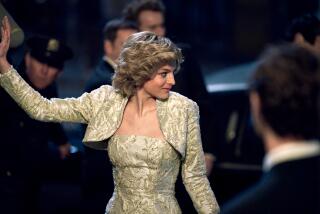Saving the Queen From Woe in ‘Mrs. Brown’
- Share via
If “Mrs. Brown” is to be believed, and there’s no reason it shouldn’t, Queen Victoria was quite a handful. A tyrannical termagant, she insisted on initiating all conversations and spoke of herself in the regal third person. And, like many a Hollywood star, she was surrounded by people who didn’t dare tell her when she was acting like a brat.
There was, however, an exception to this rule. John Brown.
A Scottish servant known for good reason as “a Highlander of independent mind,” Brown was as difficult as Victoria, every bit her equal in stubbornness and pugnacity. And though the turbulent yet affectionate relationship between these two depicted in “Mrs. Brown” sounds like yet another made-for-the-movies pairing, it turns out to be largely true.
Partly financed by WGBH/Mobil Masterpiece Theatre, “Mrs. Brown” is, not surprisingly, a decorous, always involving costume drama about a love too genteel to speak its name. What puts it ahead of the curve are the impressive, commanding performances by Judi Dench as the mighty monarch and Billy Connolly as the sterling Scot.
A favorite of Albert, the Queen’s husband, Brown had first met Victoria while the Prince Consort was still alive. But in 1864, when he is called back to her service, Albert has died and the Queen is in deepest mourning. “She is in a state of unfettered morbidity,” wrote Sir Henry Ponsonby (Geoffrey Palmer) to his wife. “We are all prisoners of the Queen’s grief.”
Brown is called up in the hopes of breaking through Victoria’s gloom, but at first he merely irritates her by his tendency to “speak how I find.” As Stanley Weintraub wrote in his authoritative “Victoria: An Intimate Biography,” Brown was “rough but shrewd [and] addicted to homely, outspoken observations that ignored rank and status.”
Surrounded by flummery and flatterers, many of whom were her own children, Victoria increasingly warmed to Brown’s plain speaking and complete devotion to both the truth and her royal person. The type who would just blurt out, “Lift your foot, woman,” when he was helping the Queen onto her horse, Brown brought a smile to Victoria’s face more readily than anyone else.
Naturally their relationship, plus Brown’s contempt for protocol, made nothing but enemies among the snobbish and insecure at the stuffy royal court, which took in just about everybody. When he gets the Queen to dance a Highland jig and threatens to turn her into a party animal, no one but Her Majesty is very much amused.
Typical were the remarks of one high-ranking lord, quoted by Weintraub: “Long solitary rides, in secluded parts of the park; constant attendance upon her in her room; . . . everything shows that she has selected this man for a kind of friendship which is absurd and unbecoming her position. The Princesses--perhaps wisely--make a joke of the matter, and talk of him as ‘Mama’s lover.’ ”
*
Though historians are convinced physical intimacy between this unlikely couple was out of the question, that didn’t stop contemporary gossips, who dubbed Victoria “Mrs. Brown,” called Mr. B “the Queen’s stallion” and even speculated in print that she had given birth to his child. What the Globe would have done with the situation is thankfully beyond speculation.
Under the careful direction of journeyman John Madden (“Ethan Frome,” “Golden Gate”), Jeremy Brock’s script satisfyingly illuminates this unexpected but real bonding. There was, however, apparently no dramatic crisis in this relationship, and no evidence that, as the ads grandly claim, “their extraordinary friendship transformed an empire.” So “Mrs. Brown” cheerfully invents a drama and drags in Prime Minister Benjamin Disraeli, deliciously played by Antony Sher, as a prime mover. A little less huffing about sacrifice and duty might have been nice, but maybe that’s why the sun has yet to set on Hollywood’s empire.
Though she is one of the reigning monarchs of British acting, Dench has never had the lead in a theatrical feature before. She is a thorough treat here in one of those tour de force performances, able to scrunch her face up like a regal prune whenever she feels her authority threatened.
Connolly, who has built a career out of being an unconventional stand-up comedian, was a smart choice to play opposite Dench. Their personality types match up splendidly with the characters they play as well as each other, and “Mrs. Brown’s” greatest pleasure is seeing and hearing them spar. Even with the gloves on, this is a battle well worth observing.
* MPAA rating: PG, for a beating, language and brief nudity. Times guidelines: male nudity during a swimming scene.
(BEGIN TEXT OF INFOBOX / INFOGRAPHIC)
‘Mrs. Brown’
Judi Dench: Queen Victoria
Billy Connolly: John Brown
Geoffrey Palmer: Henry Ponsonby
Antony Sher: Disraeli
Gerard Butler: Archie Brown
A BBC Scotland, WGBH/Mobil Masterpiece Theatre, Irish Screen production, released by Miramax Films. Director John Madden. Producer Sarah Curtis. Executive producers Douglas Rae, Andrea Calderwood, Rebecca Eaton, Nigel Warren-Green. Screenplay Jeremy Brock. Cinematographer Richard Greatrex. Editor Robin Sales. Costumes Deirdre Clancy. Music Stephen Warbeck. Production design Martin Childs. Art director Charlotte Watts. Running time: 1 hour, 43 minutes.
* At selected theaters.
More to Read
Only good movies
Get the Indie Focus newsletter, Mark Olsen's weekly guide to the world of cinema.
You may occasionally receive promotional content from the Los Angeles Times.











